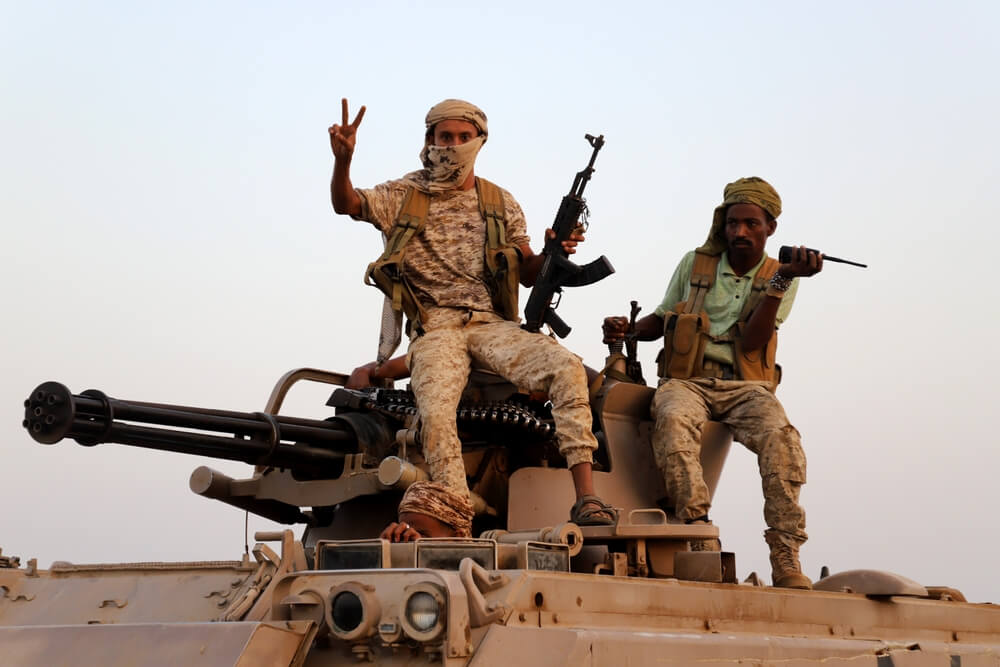Yemen has been overshadowed by other global crises but the nearly 10-year-old conflict grinds on and millions continue to suffer.
It is only through the prism of security and terrorism that countries pay attention to Yemen, say human rights activists, while more than 18 million people rely on aid to live and talks towards a durable peace are practically non-existent.
Amid a humanitarian disaster, the US this week described missile attacks against tankers in the Red Sea by Iran-backed Houthi rebels “reckless acts of terrorism”.
But the only way to protect against the attacks and its attendant effects on living standards in the richer world is to push for a lasting peace in Yemen to end clashes along numerous frontlines within the country, give more hope to people, and so reduce the Houthis’ recruiting space, say analysts.
“I am frustrated because we have seen the progress the Yemenis so desperately need overtaken by a regional situation that is beyond our control,” Hans Grundberg, UN special envoy for Yemen, told the Security Council in June. “I am also concerned by the escalatory measures and rhetoric by the parties.”
Attacks in the Red Sea
The Houthis, or more formally Ansar Allah (Partisans of God), champion Yemen's Zaidi Shia Muslim minority. After the Houthis took control of large swathes of northern Yemen in 2014, Saudi Arabia and other Arab states began an air campaign against them, with the US, UK and France giving logistical and intelligence support.
A truce brokered in 2022 put an end to strikes by the Saudis, who were rewarded two weeks ago when the US confirmed it would resume sales of offensive weapons after imposing limits for three years on human rights grounds.
Since January, it has been the US and UK that strike the Houthis with the aim of protecting Red Sea shipping lanes, while Israeli fighter jets conducted an air strike in Yemen for the first time in July in retaliation for a Houthi drone attack on Tel Aviv.
Since the Gaza conflict erupted last October, the Houthis have carried out more than 70 attacks in the Red Sea
Since the Gaza conflict erupted last October, the Houthis have vowed solidarity with the Palestinians and have carried out more than 70 attacks in the Red Sea, sinking two vessels, seizing another, and killing at least three sailors.
More recently, the UN voiced fears of an oil spill after the Houthis set fire to a tanker, the Greek-owned Sounion, that was carrying 1 million barrels of Iraqi crude when it was disabled in a missile attack on 21 August. The 25 crew members were rescued by a European warship.
The US says an oil spill from the Sounion might be almost four times as large as the 1989 Exxon Valdez disaster in Alaska that contaminated 1,300 miles of coastline.
The Houthis said they agreed to let the burning tanker be towed away to avert environmental disaster but the EU’s naval mission providing security to private companies said this week that the companies had called off salvage efforts because it was too unsafe, with fires continuing to burn on the main deck.
Another two crude oil tankers were attacked on 1 September, prompting the US Military’s Central Command to say: “These reckless acts of terrorism by the Houthis continue to destabilise regional and global commerce, as well as put the lives of civilian mariners and maritime ecosystems at risk.”
The Red Sea attacks have hit supply chains, caused a spike in shipping costs and constrained the supply of shipping space and containers as vessels are forced to take the longer route around Africa.
Doing nothing is not an option
But the conflict within Yemen and its toll on the people is rarely mentioned. The country is divided between the Houthis in the north and the UN-recognised government in the south. Although there has been a decline in violence, warring parties continue to commit unlawful attacks and killings with impunity, says Amnesty International.
 Although there has been a decline in violence, warring parties continue to commit unlawful attacks and killings with impunity
Although there has been a decline in violence, warring parties continue to commit unlawful attacks and killings with impunity
“Yemen is already facing one of the worst ongoing humanitarian crises in the world and the recent military escalation in the country, following US and UK air strikes on Houthi targets, risks worsening an already grave situation for the civilian population,” the human rights group said earlier this year.
Yemen experienced the largest ever reported cholera outbreak in recent history between 2016 and 2022, says the UN. Last month, the UN said acute malnutrition in government-controlled areas is rising rapidly, affecting more than 600,000 children.
The situation is more difficult to assess in the north where the Houthis have been forcibly disappearing Yemen aid workers, activists and anyone else deemed critical, endangering aid that is already at diminished levels. Only 28% of a total of $2.71 billion needed for the UN’s humanitarian response this year had been received as of 28 August.
It has been particularly difficult to know the true state of Yemeni human rights since 2021, when Saudi Arabia backed by the United Arab Emirates voted against a resolution at the UN Human Rights Council that would have renewed the mandate of a Group of Eminent International and Regional Experts on Yemen.
For the sake of peace, there is a strategic case for engagement with the Houthis because no military action will tame them, Farea Al-Muslimi wrote in a recent Chatham House blog.
“It is clear that doing nothing is not an option,” he wrote. “That would allow the Houthis an unobstructed path to further destabilise Yemen, dim prospects for peace, and build a mafia-style state at the heart of the Arabian Peninsula and the Red Sea.”